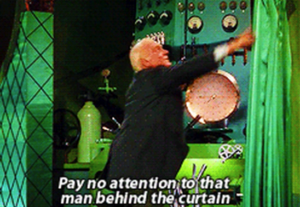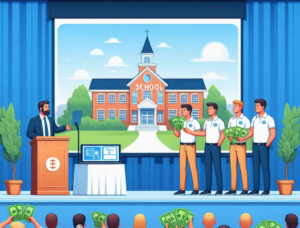 “Pay no attention to that man behind the curtain.”
“Pay no attention to that man behind the curtain.”
That famous saying came from Wizard of Oz movie. It refers to the Wizard of Oz being exposed as a “normal” man behind the curtain pulling the strings to create the perception of something much different than what it really was in real life.
Today the saying lives on to point to the need for people to explore the powers controlling things behind the scenes. No where does this apply more than to the need for school leaders to scrutinize school safety conference speakers whose presence as a speaker is paid for by a school safety vendor.
Is your school safety presenter bought and paid for by security vendors? If so, is their message bought and paid for too?
A school district assistant superintendent shared with me how she was disappointed after going to a school safety conference to hear from a former school leader in a district that experienced a school shooting. She was hoping to hear lessons learned that could benefit her oversight of school safety. What stood out most, however, were messages spread throughout the presentation about the vendor company that underwrote the costs of the speaker’s presentation.
This assistant superintendent is not the only person with such experiences. A reporter told me about a keynote conference speaker at an education conference who made subtle remarks that were suggestive that the “partner” who sponsored the person’s presentation would be helpful in preventing a school crisis.
Then you have conference sessions facilitated by, or even presented by, vendors’ “business development” leaders (aka: salespersons). They frequently are not experts in school safety. They are, however, experts in being salespersons and experts in whatever their company is selling. Yet at times they present about school safety as if they have education, training, and experience in the field.
The challenge arises when conference attendees do not consciously connect the dots between the speaker and their wizards behind the curtains — the companies that paid for the speakers who are on the stage presenting about school safety.
Let’s face it: Most educators and school safety professionals who go to conferences do so to attend sessions to learn and then relax a bit in the evenings in the communities where the conferences are being held (which are often of high entertainment attraction). They are NOT closely scrutinizing the speakers for hidden connections and messages associated with the vendors who paid for them to present.
Vendor = Exhibitor = Sponsor = “Partner”: The shifting and softening language when school safety vendors pay-to-play
The good news is that there are still education and school safety conferences where professional speakers can present on school safety, security and emergency preparedness without strings attached to their messages, experiences, and guidance on best practices. They still have vendors, but they operate primarily in their vendor hall. If they give a presentation, it is clearly labeled as a vendor’s presentation. In short, the lines are drawn and clear.
 The bad news is that many education and school safety conference hosts have allowed security hardware, product, and technology vendors to buy access to the presentation stage by underwriting the costs of speakers they choose. I outlined this in my February blog titled, “Dancing with the Devil”: How some education associations and school safety conference organizers are selling their souls and conference agendas to security vendors — and potentially increasing school safety and liability risks for superintendents and school boards.”
The bad news is that many education and school safety conference hosts have allowed security hardware, product, and technology vendors to buy access to the presentation stage by underwriting the costs of speakers they choose. I outlined this in my February blog titled, “Dancing with the Devil”: How some education associations and school safety conference organizers are selling their souls and conference agendas to security vendors — and potentially increasing school safety and liability risks for superintendents and school boards.”
The language has changed over the years. A couple decades back vendors were called vendors and exhibitors. Vendors set up in exhibit halls or areas where conference attendees chose whether or not to visit vendors’ booths. The boundaries were clear.
Over the years, vendors and exhibitors became “sponsors.” They not only have booths in the exhibit hall. They pay for breakfasts, lunches, snacks, swag giveaways, cocktail meetings, and the list goes on. Vendors learned that sponsoring beyond the exhibit hall booth gave them greater access to conference attendees.
Conference hosts learned that having vendors sponsor expensive conference activities such as meals, entertainment gatherings, etc. helped make the conference more profitable to their that is organization hosting the conference. One district leader shared about feeling pressured by school board members who go to vendor-hosted luncheons and then want their district administrators to open the doors to hear the vendors’ sales pitches out of a perceived obligation to do so because the board member went to a free lunch!
Today, vendors are in the exhibit halls and sponsoring anything and everything to gain greater access to attendees. They also are “partners” (a softer and more gentle term than vendor or exhibitor, for sure) with the conference host to pay for the costs and expenses of keynote and other high-profile conference presenters. This saves the conference host money and allows the “partners” (aka: vendors) to pick up the tab for speakers, which in turn buys the sponsoring vendors closer affiliation with the school safety topic and potentially closer access to influence the audience.
It is possible, if not probable, that vendors are even picking up the tabs for top school administrators from their client school districts to attend conferences to speak in sessions on topics that praise the vendors’ products or tech, and directly or indirectly help their marketing and sales goals. In some school districts and states, activities such as vendors paying for school leaders to attend conferences that benefit their companies (which in turn sells to the school district) could potentially raise ethics questions.
The bottom line: If the vendors do not expect to get something out of paying the costs for speakers, whether that is access by association with the speaker or influencing the speakers’ messages, they would not be dishing out the money to be “partners” to “sponsor” the costs of the presenters. Sponsoring speakers typically involves paying thousands of dollars in speaker fees and expenses.
Educators and school safety professionals need to be critical thinkers and exercise due diligence in scrutinizing speaker affiliations with vendors
The financial reality is that vendors are needed for education and school safety conferences to put on their events. Food, beverage, room space, and other costs exceed what conference hosts can build into conference attendee registration costs.

So it is incumbent upon conference attendees to scrutinize speaker affiliations with vendors. If you hear that XYZ company is a sponsor or “partner” that paid for the speaker, look at what XYZ sells and listen more closely to the speakers’ messages for potential veiled or direct references to what the vendors sell.
Also look at what speakers DON’T say — what they waffle on when it comes to being critical of strategies that involve the use of products or services the sponsoring vendor sells. Sometimes there is pressure on speakers not to be critical of certain school safety strategies, or not to discuss gaps and limitations of those products, services, or technology, out of fear that it might offend vendors who are sponsoring aspects of the conference.
The bottom line: School administrators need to be critical thinkers and exercise due diligence in scrutinizing school safety conference speaker affiliations with vendors.
A peep behind the wizards’ curtians might shed some light on the powers who are controlling things behind the scenes.
Dr. Kenneth S. Trump is President of National School Safety and Security Services
National School Safety and Security Services
Experts You Can Trust!
Connect with Dr. Ken on Linkedin: www.linkedin.com/in/kentrump/
Follow Dr. Ken on Twitter @safeschools
Visit and “Like” Our Facebook School Safety News Channel at: www.facebook.com/schoolsafety

